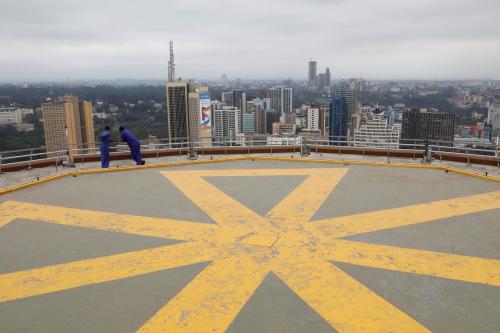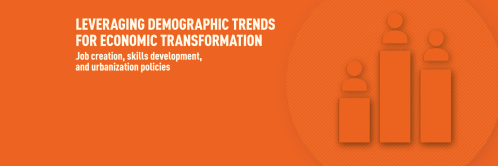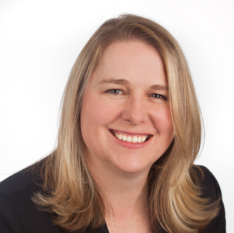Below is a Viewpoint from Chapter 3 of the Foresight Africa 2020 report, which explores six overarching themes that provide opportunities for Africa to overcome its obstacles and spur inclusive growth. Read the full chapter on leveraging demographic trends for economic transformation.
Africa is the youngest and fastest-growing continent in the world, which, in a few decades, will also have the largest workforce. While this trend creates unprecedented opportunities for the continent, it will also exacerbate the significant gap between the number of young people seeking work and the limited employment opportunities.
In 2018, the Mastercard Foundation (MCF) launched our new strategy, Young Africa Works. Through this strategy, the Foundation aims to enable 30 million young people to access dignified and fulfilling work by 2030. The Foundation has taken a unique approach in that goes beyond being a funder: It is co-creating strategies with governments, the private sector, entrepreneurs, educators, and young people—strategies that, consequently, resonate with their aspirations. For example, MCF is:
- Strengthening the private sector environment by scaling access to finance for small businesses;
- Partnering with training and education institutions to enhance education and skills development systems to ensure they support the development of market-relevant skills; and
- Ensuring the labor market functions better by supporting platforms that facilitate the job search for young people.
While the strategy is in early stages in seven countries, preliminary lessons are emerging from the initiative in Rwanda. Hanga Ahazaza—”create the future”—is a $50 million program aiming to enable 30,000 Rwandan youth to find employment in the tourism and hospitality sector—a high-growth area and national priority for Rwanda. Since the launch last year, MCF has been working with partners from the education, development, and the private sector to train, certify, and link more than 2,500 young Rwandans to dignified and fulfilling work in the sector. The following key lessons are emerging from this program:
Start with helping to create jobs for skilled labor. MCF recognizes that to effectively address youth un- and underemployment, policymakers and partners need to first understand the root causes of low employment creation. While the strategy in Rwanda started with skills development and training (the supply of skilled labor), it is now helping small businesses in the sector grow and create jobs.
Put young people’s needs at the center. Young people in some of our training programs, particularly young women, struggle to find time to complete the full training due to shift work or competing demands at home—a finding consistent with previous research. Across the MCF programs for young people, gender-responsive components are proving effective in gender equality in relation to participation, performance, and opportunities for youth participants.
Promote female role models in the workforce to help shift gender norms. While the tourism sector in Rwanda is poised to grow and create opportunities, it is not viewed as a suitable place to work for young women. As a result, gender balance in recruitment remains a challenge. Through role modeling and increased communications, one partner saw a 16 percent increase in the number of women applying for a position (from 34 percent to 50 percent). Helping potential participants see themselves working in the sector by seeing others work there has been helpful in shifting gender norms.
Facilitate collaboration among partners through shared data platforms and impact measurement approaches. The Foundation is encouraging collaboration and information-sharing among our implementing partners such as Harambee, Horvath, and Inkomoko. A joint platform has allowed our partners to plan events together, share documents, and quickly share programmatic updates and results. With this tool, monthly team and partner meetings are more efficient and focus on key issues rather than updates. The MCF team also created a database called “Touripedia” to provide information on micro-, small-, and medium-sized businesses in Rwanda to help partners coordinate their training and other activities.
Encourage other organizations and institutions to join the movement for greater impact. As the Rwandan example illustrates, most businesses in the tourism and hospitality sector are micro or small in size and rely on friends and family for capital. For that reason, the Foundation encourages financial institutions to take more risk, invest in young entrepreneurs and startups, and develop new products and services to support this growing sector. It also encourages employers to continue to invest time and resources to train and support young job seekers. They must also work closely with education institutions to share experiences, strengthen curricula, and provide internships and other support so that young people can successfully transition to full-time employment.
As the Foundation rolls out the Young Africa Works country strategies elsewhere on the continent, it will continue to learn and share these lessons with partners, stakeholders, and peers. Most importantly, the Mastercard Foundation will continue to listen to young people in Africa.
Lindsay Wallace is the head of impact for the Mastercard Foundation, which supports AGI’s work on youth employment. The views expressed in this article are those of its authors and do not represent the views of the Mastercard Foundation, its officers, or employees.
The Brookings Institution is committed to quality, independence, and impact.
We are supported by a diverse array of funders. In line with our values and policies, each Brookings publication represents the sole views of its author(s).








Commentary
Young Africa Works: A strategy to create 30 million jobs for youth over the next decade
February 5, 2020